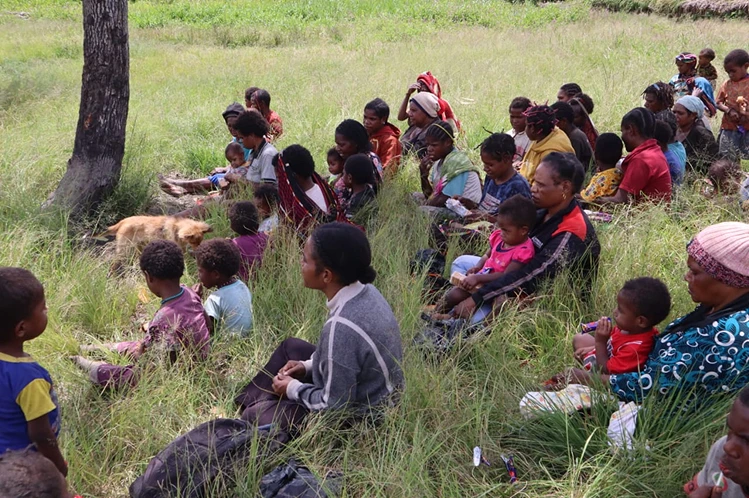
CSI highlights discrimination against West Papua indigenous people
Addressing the United Nations in Geneva CSI’s Joel Veldkamp called out the ongoing dispossession of and violence against the indigenous peoples of West Papua in Indonesia.

CSI is supporting displaced people in Wamena with seeds for growing crops. csi
MEDIA RELEASE
28 March 2024
GENEVA – CSI used its platform at the UN Human Rights Council on Wednesday to raise the plight of the Christian peoples of West Papua in a general debate about racism and racial discrimination.
In a statement delivered on behalf of CSI, Dr. Joel Veldkamp drew the Council’s attention to the “ongoing dispossession of the indigenous peoples of West Papua in Indonesia,” a dispossession he said is “undergirded by a system of racial discrimination.”
Colonization and exploitation
West Papua is the easternmost part of modern-day Indonesia. While Indonesia is the largest Muslim-majority country in the world, the indigenous peoples of West Papua are almost completely Christian.
West Papua was made a colony of the Netherlands in 1898, and was administered separately from Dutch-ruled Indonesia. It was only handed over to Indonesia in 1962, thirteen years after Indonesia became independent. This decision provoked widespread protests and an independence movement that continues until today.
West Papua is home to some of the largest gold and copper deposits in the world. Moreover, its tropical forests host some of the world’s best-preserved biodiversity. In order to secure control over these resources, successive Indonesia governments have subjected West Papua to military occupation and settled hundreds of thousands of non-Papuans on the land. Indonesian military operations continue until today, and tens of thousands of West Papuans have been displaced by them.
Indonesia’s February 2024 presidential elections were won by Prabowo Subianto, the son-in-law of Indonesia’s former president Suharto, one of the twentieth century’s most brutal dictators. Prabowo himself was implicated in many atrocities in West Papua in the 1990s. West Papuans fear what his election means for their future.
CSI calls for reforms
Veldkamp highlighted five areas in which West Papuans face racial discrimination: a lack of access to healthcare and education services, the appropriation of their land by the Indonesian government for mining projects and plantations, the long-running military operations that accompany those resource extraction projects, police violence against indigenous West Papuans, and the lack of political representation of West Papuans in their own government.
“We urge the government of Indonesia to implement immediate reforms to ensure autonomy, safety, and equal access to services for the indigenous people of West Papua, in the spirit of the Durban Declaration and Plan of Action,” Veldkamp concluded. “We also urge the Human Rights Council to increase its engagement and monitoring of this situation. The West Papuans’ sixty-year struggle for freedom calls for no less.”
CSI’s statement came in the general debate under Item 9 on the agenda of the UN Human Right Council: “Racism, racial discrimination, xenophobia and related forms of intolerance: follow-up to and implementation of the Durban Declaration and Programme of Action.”
CSI is partnering with local church groups in West Papua to support human rights projects and provide humanitarian aid to displaced West Papuans.
CSI at the UN: West Papuan indigenous people face racial discrimination

